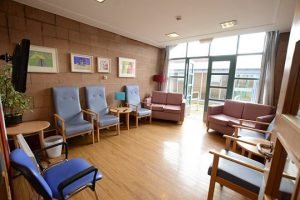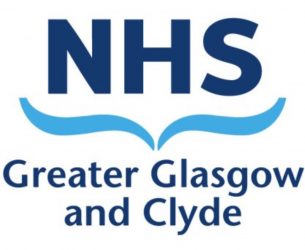Ward Information
The Physically Disabled Rehabilitation Unit (PDRU) is a purpose built building in the grounds of the Queen Elizabeth University Hospital, Glasgow. It has 20 inpatient beds comprised of a mixture of 4 bedded bays and en-suite single rooms. We also have a patient dining area, gymnasium and a variety of treatment rooms including therapy kitchen and bathroom. Additionally there is a quiet room for private discussions and a space for patient education, groups and meetings. We have a garden and patio area and large communal living spaces with flat screen TVs and a DVD player.
Visiting times: 13:30 to 20:30. We ask that you avoid visiting at meal times and during scheduled therapy activities.

Meal times:
- Breakfast: 08:00-09:00
- Lunch: 12:00-13:00
- Dinner: 17:00- 18:00
Snacks and drinks are available from the patient dining area out-with meal times. The hospital operates a Food and Health Policy. Its aim is to increase awareness of the relationship between food and health, and to promote healthy eating habits. The hospital also provides menus for those on special diets or those who require something different because of their religion or culture (e.g. halal food). For more information please ask a member of nursing staff.
What to bring with you
The following list contains essential items that you should bring with you:
- All medication you are taking
- Any splints or orthotic devices you use
- Glasses, hearing aid or any communication devices you use
- Toiletries
- Nightwear
- Several changes of comfortable loose clothing suitable for wearing in the gym
- Comfortable, well fitting trainers/shoes (no heels or slip-on shoes)
- Reading material or other items to help occupy yourself.
- Water bottle for use in gym (optional)
Please bear in mind that bedside storage space is limited.
There are no laundry facilities available in the unit. Please arrange for family/friends to collect your washing for you.
Guidance on safe washing practices can be found at: http://www.nhsggc.org.uk/media/233837/july-2015-washing-clothes-at-home.pdf
Please do not bring any alcohol or illegal substances, as we do not permit their consumption.
Please do not bring large quantities of money, valuables or personal effects with you. The hospital does not accept any responsibility for loss of, or damage to, personal effects unless handed in for safekeeping. You may require a minimal amount of money for telephone calls, papers, etc.
If you do bring valuables, they may be deposited for safekeeping. Please ask the Senior Charge Nurse to arrange this. We will arrange for the return of the items as part of your discharge arrangements.
What to do if you can’t make your admission date
If you are no longer able to make your admission date, please phone the ward/ medical secretary on the phone number on your letter so that we can re-arrange the date for you.
Arrival at the PDRU
If arriving from home please report to the reception desk and you will be orientated to the ward by a member of staff and shown where your room is.
If you are being transferred to the PDRU from another ward, the nursing staff will have already received a handover from your previous ward. They will show you to your room and then orientate you to the ward.
All patients will be assessed by a doctor, member of nursing staff, physiotherapist and occupational therapist during the first couple of days of admission. A speech and language therapist and neuropsychologist may assess you during your admission if you require their input during your stay.
What to expect
On your first day you will be assessed by the medical and nursing staff. Within the first two days you will be allocated a keyworker and will be fully assessed by physiotherapy and occupational therapy staff. A therapy timetable will be agreed upon. Most patients attend the gym twice a day, morning and afternoon. A variety of upper limb group sessions are run that you may be involved in if required. Additional therapy activities include balance class, breakfast club and one-to-one sessions to focus on washing, dressing, transfers and kitchen practice as required.
Weekly patient education groups take place in the unit covering a variety of topics. It is expected that all patients attend these as part of their rehabilitation. Family/carers are welcome to attend also. Posters about upcoming topics are displayed around the unit and a stand with information and resources relevant to these groups can be found on the ward.
If required you will be referred to clinical neuropsychology or speech & language therapy for assessment and ongoing therapy input will be agreed upon if required. You may also be referred to other services (e.g. orthotist, dietician, podiatrist, smoking cessation, social work) if needed.
The medical staff will meet you on their weekly ward round. This is a good time to ask them any questions you have about your medical care. However there are always doctors available to ask questions out-with the ward round.
Goal planning meetings
Within two weeks of your admission a goal planning meeting will be arranged by your keyworker. This meeting lasts approximately 20minutes and all members of the interdisciplinary team that are involved with your care attend this meeting. Up to two members of your family and/or carers/friends are welcome to attend this meeting. At this meeting, individualised rehabilitation goals will be agreed upon and you will be provided with an estimated date of discharge. A goal review/pre-discharge meeting is also normally arranged. However if you have any questions out-with these meetings please do not hesitate to get in contact with your keyworker or another member of staff.
Amenities
The PDRU has several amenities including patient dining area, gymnasium and a variety of treatment rooms including therapy kitchen and therapy bathroom. Additionally there is a quiet room for private discussions and a space for patient education groups and meetings. We have a garden and patio area and large communal living spaces with flat screen TVs and a DVD player. There is a patient fridge for storage of food/drinks that you may wish to make use of.
There is also a cinema within the ground of the Queen Elizabeth University Hospital that patients can access on Tuesday and Thursday evenings. Upcoming films are advertised within the ward. There is a patient art class on Tuesday evenings that all are welcome to attend. We also have a range of games, books & DVDs available for entertainment purposes.
Keeping in touch
By post: Ward staff will post stamped letters. Family and friends may write to you, but please ask them to write your full name and ward number clearly on the envelope.
By telephone: Mobile telephones may be used in designated areas. We request that you do not use them during therapy sessions.
Calls to the hospital should be kept to a minimum, and be made by only one relative or friend who can then inform other members of your family or friends of your progress.
Guidelines for visitors
Visiting times are: 13:30-20:30
Visitors should follow these guidelines:
- On arrival at ward level all visitors should wash their hands with the gel located at the entrance to the ward. This is applied by squirting a little gel onto the hands, massaging it in like hand cream and allowing it to air dry naturally.
- Only 2 visitors per bed at any one time
- Children must be accompanied by an adult and be supervised at all times.
- Babies should only be brought at the discretion of the parents and Nursing Staff
- Respect the privacy of patients and families
- Keep noise to a minimum
- No smoking within hospital buildings and grounds.
- Visitors should not visit if suffering from colds, ’flu’ or other infectious conditions. If you are uncertain, please ask a member of nursing staff for advice
- Visits outside normal hours are possible by arrangement with the Senior Charge Nurse
Discharge Planning & Follow up arrangements
Arrangements for your discharge will be discussed at your goal review/pre-discharge meeting and you and your family will be fully involved in this. Your ongoing care requirements will be assessed by the team and a care package and any essential equipment will put in place prior to your discharge. Some patients may require a home visit prior to discharge and this will be arranged with the Occupational Therapists.
If you require ongoing rehabilitation at home then this will be arranged and you will be given contact information for the relevant teams. You may also be provided with a home exercise programme, or given information on how to access community resources such as gyms in your local area.
Travel Arrangements: If you wish, the nursing staff will notify your relatives or friends to make the necessary arrangements, or you can do this yourself. If we consider an Ambulance is necessary then we will arrange this.
Medical Arrangements: If you are to be discharged on medication you will receive 7 days supply. You will also receive a letter for yourself and your GP detailing your prescription and other aspects of your treatment and discharge plan. Further details of your treatment will be sent to your GP within 7 days
Following discharge you will be provided with a clinic appointment in approximately 3-6 months time to review your ongoing rehabilitation progress.
Travel costs
You may be entitled to help with necessary travel costs to and from hospital if you receive NHS treatment under the care of a consultant and have a low income or receive certain benefits or credits. For more details please see the NHS Scotland leaflet HCS1 – Are you entitled to help with health costs.
You can download a copy of this leaflet here or from the Scottish Government website at: http://www.scotland.gov.uk/healthcosts.
Please ask a member of nursing staff if you require further information. Alternatively, you can telephone the NHS Helpline on 0800 224488 (Monday to Friday, 8am to 6pm).
